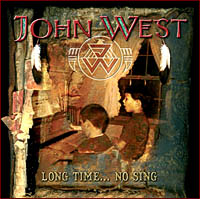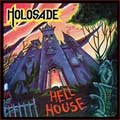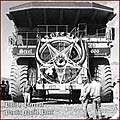JOHN WEST (usa) - Long Time... No Sing (2006)

Label : Frontiers Records / Nocturne
Sortie du Scud : 9 juin 2006
Pays : France
Genre : Hard Rock mélodique
Type : Album
Playtime : 12 Titres - 48 Mins
Depuis Earth Mover, cela faisait 4 ans que John West n’avait pas livré d’album solo, d’où le titre de cette nouvelle galette : Long Time... No Sing, avec un jeu de mots en prime.
Le chanteur de ROYAL HUNT et de ARTENSION change d’orientation musicale en nous livrant un album de Hard Rock mélodique, style dont il nous avait déjà prouvé son intérêt à différents moments de sa carrière. Il s’y plonge ici pleinement et le résultat est franchement positif.
West ne prétend probablement pas révolutionner le Rock, il se fait plaisir avec des compositions simples mais de qualité. Cette simplicité et l’absence d’éléments notables dans la composition rendent les premières écoutes peu enthousiasmantes, il faut donc se laisser bercer sans se poser de question pour admettre que l’ensemble est réussi.
Long Time... No Sing plonge allègrement dans le vieux Hard Rock et emprunte beaucoup à RAINBOW, WHITESNAKE et, plus récemment au répertoire de Glenn Hughes (lui-même pas réputé pour ses innovations !). Mais les mélodies sont plus appuyées ce qui donne à cet album de forts accents AOR.
Après une courte intro dispensable, surgit la mélodie accrocheuse de “Fade” qui est une petite merveille. Ce ne sera pas la seule réjouissance de cet album : “The One That Got Away” est prodigieuse d’équilibre : de gros riffs lourds d’un côté, de douces mélodies de l’autre, le tout se mariant par miracle. “Set Me Free”, “Over My Head” et “Give Me A Sign” font facilement leur chemin jusqu’au cerveau ! Les ballades m’ont semblé moins convaincantes à l’exception de “Highway To Roppongi” qui intègre beaucoup de Blues. Le tout s’achève sur un instrumental agréable (mais que l’on n’écoutera pas plusieurs fois !) qui reprend certaines mélodies des chansons du reste de l’album.
La production est bien meilleure que sur les précédents albums solos.
Ajouté : Jeudi 06 Juillet 2006
Chroniqueur : Alexis de Fireball
Score :    
Lien en relation: John West Website
Hits: 19035
|














